
Helmut Josef Michael Kohl was a German politician who served as Chancellor of Germany from 1982 to 1998 and Leader of the Christian Democratic Union (CDU) from 1973 to 1998. Kohl's 16-year tenure is the longest of any German chancellor since Otto von Bismarck, and oversaw the end of the Cold War, the German reunification and the creation of the European Union (EU). Furthermore, Kohl's 16 years and 30-day tenure is the longest for any democratically elected chancellor of Germany.
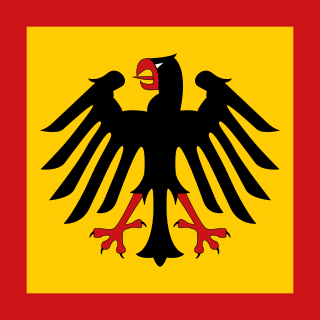
The president of Germany, officially titled the Federal President of the Federal Republic of Germany, is the head of state of Germany.
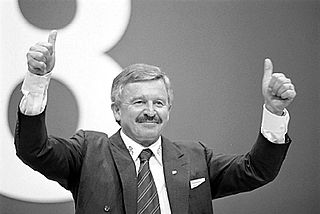
Jürgen Wilhelm Möllemann was a German politician of the Free Democratic Party (FDP) who served as Minister of State at the Foreign Office (1982–1987), as Minister of Education and Research (1987–1991), as Minister of Economics (1991–1993) and as the vice-chancellor of Germany (1992–1993) in the government of Chancellor Helmut Kohl.
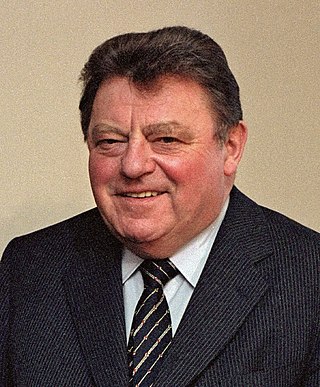
Franz Josef Strauss was a German politician. He was the long-time chairman of the Christian Social Union in Bavaria (CSU) from 1961 until 1988, member of the federal cabinet in different positions between 1953 and 1969 and minister-president of the state of Bavaria from 1978 until 1988. Strauss is also credited as a co-founder of European aerospace conglomerate Airbus.

Bernhard Vogel is a German politician of the Christian Democratic Union (CDU). He was the 4th Minister President of Rhineland-Palatinate from 1976 to 1988 and the 2nd Minister President of Thuringia from 1992 to 2003. He is the only person to have been head of two different German federal states and is the longest-governing Minister President of Germany. He served as the 28th and 40th President of the Bundesrat in 1976/77 and 1987/88.

Sabine Bergmann-Pohl is a German doctor and politician. A member of the Christian Democratic Union of Germany (CDU), she was president of the People's Chamber of East Germany from April to October 1990. During this time, she was also the interim head of state of East Germany, holding both posts until the state's merger into West Germany in October. She was the youngest, only female and last head of state of East Germany. After the reunification of Germany, she served in the government of Chancellor Helmut Kohl, first as one of many Minister for Special Affairs appointed to provide representation for the last East German government in the Kohl cabinet, then as Parliamentary State Secretary in the Ministry of Health for the remainder of Chancellor Kohl's time in office.

Federal elections were held in West Germany on 6 March 1983 to elect the members of the 10th Bundestag. The CDU/CSU alliance led by Helmut Kohl remained the largest faction in parliament, with Kohl remaining Chancellor.

Ignaz Kiechle was a German politician of the Christian Social Union in Bavaria (CSU).

The First Kohl cabinet was the 13th Cabinet of the Federal Republic of Germany. It was sworn in on 4 October 1982 following a successful constructive vote of no confidence, by which Helmut Kohl replaced Helmut Schmidt as Chancellor. It was the first German federal cabinet formed after a constructive vote of no confidence. After ascending to the chancellorship, Kohl and his coalition sought to bring about new elections as quickly as possible, which he achieved by deliberately losing a confidence motion and then having the Bundestag dissolved by the president at the chancellor's request. The following 1983 federal election on 6 March 1983 resulted in a re-election of Kohl and his newly formed CDU/CSU/FDP-coalition. On 30 March 1983, Kohl was again elected chancellor by the Bundestag and formed his second cabinet. With a duration of just under half a year, the cabinet Kohl I was the shortest-lived German government since the cabinet von Schleicher during the Weimar Republic and is, as yet, the shortest-lived cabinet in the history of the Federal Republic.

Within the politics of Germany, the Second Kohl cabinet led by Helmut Kohl, was sworn in on March 29, 1983 and laid down its function on March 11, 1987. The cabinet was formed after the 1983 elections. It was succeeded by the Cabinet Kohl III, which was formed following the 1987 elections. Starting in June 1986 it was the first West German federal cabinet to have a Minister of the Environment.
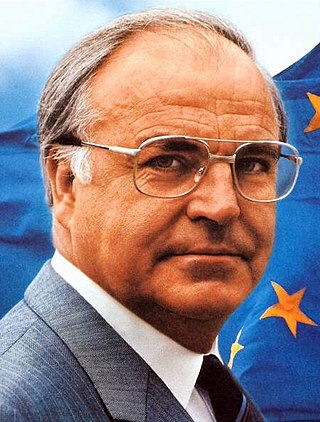
The Fourth Kohl cabinet led by Helmut Kohl was sworn in on 18 January 1991 and laid down its function on 15 November 1994. The cabinet was formed after the 1990 elections. It laid down its function after the formation of the Cabinet Kohl V, which was formed following the 1994 elections.

The Fifth Kohl cabinet led by Helmut Kohl was sworn in on 15 November 1994 and laid down its function on 27 October 1998. The cabinet was formed after the 1994 elections. It laid down its function after the formation of the Cabinet Schröder I, which was formed following the 1998 elections.
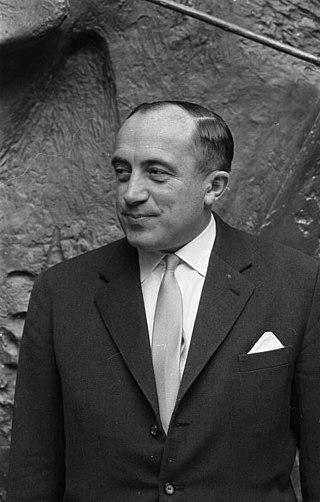
Werner Dollinger was a German politician and economist, a member of the Christian Social Union in Bavaria (CSU). He served as Federal Minister for the Treasury from 1962 to 1966, Federal Minister for Economic Cooperation in 1966, Federal Minister for Post and Telecommunications from 1966 to 1969, and as Federal Minister of Transport from 1982 to 1987.

Bernd Otto Neumann is a former German politician and since 2014 president of the German Federal Film Board (FFA).
Albert Probst was a German politician for the Christian Social Union of Bavaria. From 1982 to 1991 he was parliamentary Secretary of State at the Federal Ministry for Research and Technology.
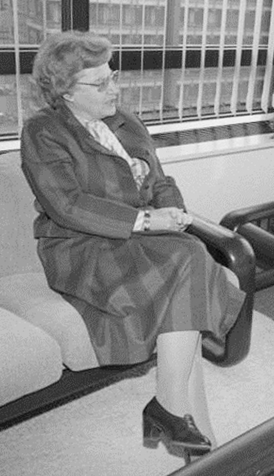
Dorothee Wilms is a German politician.
The First Schröder cabinet was the 19th Government of Federal Republic of Germany in office from 27 October 1998 until 22 October 2002. It succeeded the Fifth Kohl cabinet formed after the 1998 elections. Gerhard Schröder, Minister President of Lower Saxony, reached an agreement on a coalition with the Alliance 90/The Greens (Greens) and his Social Democratic Party (SPD), setting the stage for Schröder to become Chancellor of Germany. Joschka Fischer (Greens) replaced Klaus Kinkel (FDP) as Vice-Chancellor of Germany and Federal Minister of Foreign Affairs. The cabinet was succeeded by the Second Schröder cabinet.

Peter Hintze was a German politician of the Christian Democratic Union (CDU) who served as a member of the German Bundestag from 1990 until his death in 2016.
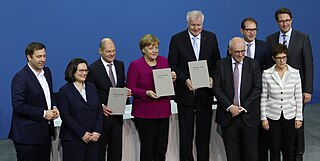
The Fourth Merkel cabinet was the 23rd Government of the Federal Republic of Germany during the 19th legislative session of the Bundestag. It was sworn in on 14 March 2018 following the 2017 federal election and dismissed on 26 October 2021, acting in a caretaker mode until 8 December 2021. It was preceded by the third Merkel cabinet and succeeded by the Scholz cabinet. Led by Chancellor Angela Merkel, it was the third cabinet under Merkel to be supported by a coalition of the Christian Democratic Union (CDU), the Christian Social Union of Bavaria (CSU), and the Social Democratic Party (SPD).

The Third Schmidt cabinet was the government of Germany between 6 November 1980 and 1 October 1982, during the 9th legislature of the Bundestag. Led by the Social Democrat Helmut Schmidt. After the 1980 federal election, incumbent Chancellor Schmidt continued the social-liberal coalition between his SPD and the FDP.

















